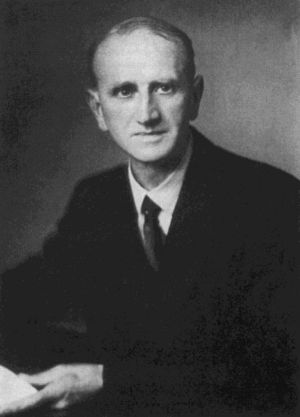Alexander Aitken facts for kids
Quick facts for kids
Alexander C. Aitken
FRS FRSE FRSL FRSNZ
|
|
|---|---|
 |
|
| Born | 1 April 1895 |
| Died | 3 November 1967 (aged 72) |
| Nationality | New Zealander |
| Alma mater | University of Edinburgh University of Otago |
| Known for | Aitken's array Aitken's delta-squared process Aitken interpolation |
| Spouse(s) | Winifred Betts |
| Awards | Fellow of the Royal Society |
| Scientific career | |
| Fields | Mathematics Statistics |
| Institutions | University of Edinburgh |
| Thesis | Smoothing of Data |
| Doctoral advisor | E. T. Whittaker |
| Doctoral students | Hans Schneider Alexander Fairley Buchan Nora Calderwood Henry Daniels Harold Silverstone Donald Livingstone |
Alexander Craig "Alec" Aitken (born April 1, 1895 – died November 3, 1967) was a brilliant mathematician from New Zealand. He was known for his amazing skills with numbers and his important work in math and statistics. He also wrote a famous book about his experiences in World War I.
He helped create new ways to understand data, like the idea of "generalized least squares." He also worked on important math ideas like the Cramér–Rao bound, which helps us know how accurate certain calculations can be.
Contents
Alexander Aitken's Journey
Alec Aitken was born on April 1, 1895, in Dunedin, New Zealand. He was the oldest of seven children. His family had Scottish roots, and his grandfather moved from Scotland in 1868.
He went to Otago Boys' High School in Dunedin. He was a top student and won a special scholarship for math in his last year.
Serving in World War I
In 1915, Alec joined the New Zealand Expeditionary Force and fought in World War I. He served in places like Gallipoli and on the Western Front. He was badly hurt during the Battle of the Somme. After spending months in a hospital in London, he returned home to New Zealand in 1917.
University and Career
After the war, Aitken continued his studies. He earned a Master of Arts degree from the University of Otago in 1920. For a few years, he worked as a school teacher at his old high school.
Later, he moved to Scotland to study for his PhD at the University of Edinburgh. His research paper, "Smoothing of Data," was so impressive that he was given a higher degree, a Doctor of Science (DSc), in 1925. Even before finishing his degree, he was recognized as a top scholar.
Aitken spent his entire career at the University of Edinburgh. He started as a lecturer in 1925 and became a full professor of Mathematics in 1946. He retired in 1965.
Secret War Work
During World War II, Alec Aitken used his incredible math skills to help his country. He worked at Bletchley Park in England, a secret location where experts tried to break enemy codes. He helped to decrypt the ENIGMA code, which was used by the German military.
An Amazing Mind
Alec Aitken was famous for being one of the best mental calculators ever. He could do incredibly complex math problems in his head very quickly. He also had an amazing memory. He knew the first 1,000 digits of Pi and could remember long poems, like the Aeneid, from when he was in high school.
However, remembering the terrible things he saw in World War I was very difficult for him. This led to him struggling with sadness throughout his life.
Aitken was also a talented writer and musician. He was even a champion athlete when he was younger. His war memoir, Gallipoli to the Somme, was so well-written that he was recognized by the Royal Society of Literature. A New Zealand composer later turned his book into a musical piece called an oratorio.
Recognized for His Work
Alec Aitken received many honors for his important contributions to math and statistics.
- He was made a Fellow of the Royal Society in 1936. This is a very high honor for scientists in the United Kingdom.
- He also became an Honorary Fellow of the Royal Society of New Zealand in 1940.
Aitken Lectureship and Prize
To honor his memory, the New Zealand Mathematical Society and the London Mathematical Society hold special "Aitken Lectureships" every two years. A mathematician from New Zealand is invited to give talks at different universities in the UK.
The New Zealand Mathematical Society also gives an annual "Aitken Prize." This award is for the best talk given by a student at their math conference. The prize started in 1995, 100 years after Aitken was born.
Family and Later Life
In 1920, Alec Aitken married Winifred Betts. She was a biology lecturer and the first female lecturer at the University of Otago. They had a daughter and a son.
Alexander Aitken passed away on November 3, 1967, in Edinburgh, Scotland.

